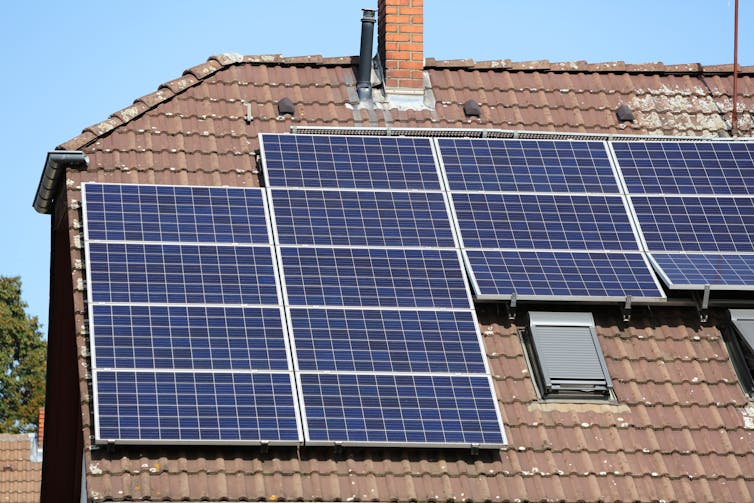
As winter approaches, and with energy bills at record highs, insulating the UK’s leaky homes has never been more urgent. With 14% of greenhouse gas emissions coming from heating and powering homes, it would also help the country meet its climate change targets – a genuine win-win.
Yet current policies to encourage more efficient energy use (and so, lower emissions) are failing. The UK’s housing stock is one of the worst insulated of all advanced economies.
Installation rates for loft, cavity wall and solid wall insulation all need to grow by an order of magnitude by the middle of this decade. Installation rates for electric heat pumps need to reach one million a year in new and existing homes by 2030, up from around 54,000 in 2021.
There is currently little or no help for the roughly 64% of households who own their own home to make these improvements, unless they qualify for schemes targeting those on very low incomes.
The government assumes they will find the money to invest in better insulation and replace their gas boilers with heat pumps, but this is reckless. The government’s own advisory body, the Climate Change Committee (CCC), has criticised the current lack of support for homeowners.

So how could we design better policies to help homeowners make their homes fit for the future? We teamed up with the CCC to try to find out. Rather than relying just on the economic modelling and technical analysis that policymakers normally reach for, we wanted to try a new approach: asking homeowners what would work best for them.
What our panel said
As part of our project on public engagement and climate change at Lancaster University, we set up and oversaw a citizens’ panel.
The panel consisted of 24 people, demographically representative of UK homeowners in terms of age, ethnicity, housing type and attitudes to climate change. Participants spent 25 hours over seven sessions, both online and in person, learning about how to eliminate carbon emissions from homes and designing solutions they thought would work for owner-occupiers.
CCC analysts, whose day job is to analyse how well government policy aligns with the UK’s legally binding climate targets, took part in the discussions and helped to shape the findings.
The panel told us that they care about tackling climate change and want to act, but the government’s assumption – that homeowners will take the initiative and make the investment their homes need – is wide of the mark. Instead, panellists stressed that they would need guidance, and help with costs, if they were to make changes.
The panellists designed a comprehensive package of support based around the life cycle of owning a home: buying it, living in it and renovating it. This would include a logbook provided to all home buyers with reliable information on what the house needed and what the costs and benefits would be.
Financial incentives would help homeowners make changes at each stage, such as stamp duty rebates and cheap financing for cosmetic renovations when rolled together with energy retrofits. Regulations would ban the most polluting products, such as gas boilers.

We have now published these findings and the CCC has written to Graham Stuart MP, the UK climate change minister, to inform him.
The benefits of deliberation
Getting policy experts to talk with members of the public seems to be an effective way to make climate policy. There have been efforts to try this before, most notably Climate Assembly UK, which asked ordinary people about their support for different climate policies. We went a step further by asking panellists to work with analysts to design a policy from scratch.
Our panel showed that giving people the opportunity to consider options and weigh up the evidence can result in workable solutions which chime with the views and life experience of the people most affected. Neglecting this perspective while designing policies can invite a backlash. Expecting people to make significant changes to their lives without adequate support could threaten the UK’s ability to meet its climate targets.
The standard tools of policy analysis, such as economic modelling and technical forecasting, are not obsolete. But they must be complemented by a more sophisticated understanding of how policies affect lives. Deliberative exercises like our panel, which include informed discussion, are quite different to other ways of taking the public’s temperature – like polls or surveys with a large sample size.
When it comes to complex problems and their solutions, many people lack stable or well-informed preferences about what they want to see happen. It is not the initial reaction to an idea captured through a poll that counts, but whether people actually support it once it is affecting their lives.
In Switzerland, where many policies are put to a referendum, research has shown significant differences between what people say their preferences are in surveys and what they end up voting for. Deliberation offers people enough information and time to develop their understanding of how different policy solutions will affect them and those like them.
The same approach we used could be applied to designing low-carbon transport in cities and towns, or reforms to the food system that balance the need for sustainability with thriving rural economies. We would like to see a much wider use of deliberation by organisations developing and delivering climate policy, from government departments, to local and regional authorities, to thinktanks and civil society groups.
With ever-pressing emission reduction targets, every policy misstep costs precious time. Why would policy makers not want to ensure they get it right the first time around?
Jacob Ainscough receives funding from UK Research and Innovation (UKRI).
Rebecca Willis receives funding from UK Research and Innovation (UKRI). She is a trustee of the New Economics Foundation.
This article was originally published on The Conversation. Read the original article.







